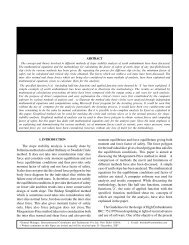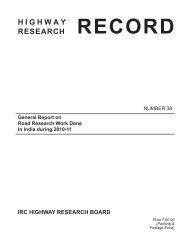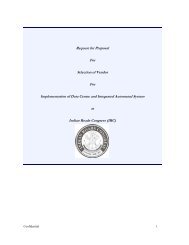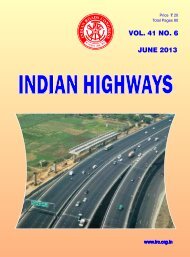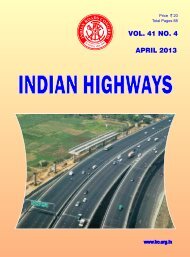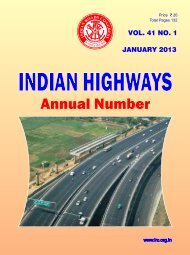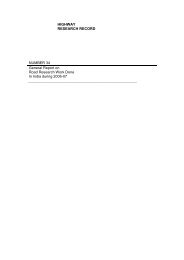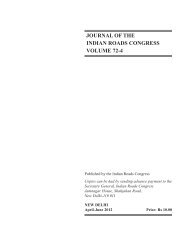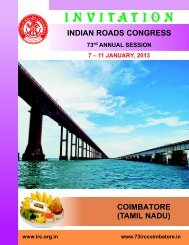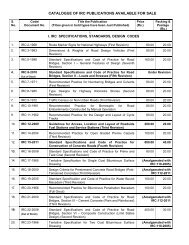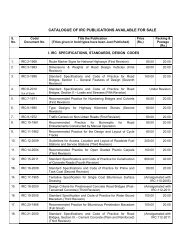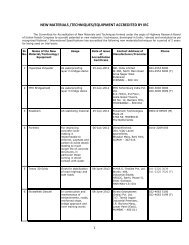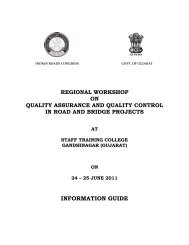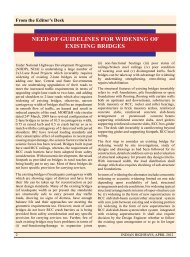Highway Research Record No. 39 - Indian Roads Congress
Highway Research Record No. 39 - Indian Roads Congress
Highway Research Record No. 39 - Indian Roads Congress
Create successful ePaper yourself
Turn your PDF publications into a flip-book with our unique Google optimized e-Paper software.
7. Feasibility Study of a patented Commercial<br />
soil stabiliser<br />
Keywords: Soil stabilisation, silt and Clay<br />
Date of Start: Feb. 2011<br />
Date of Completion: March. 2012<br />
CSIR- Central Road <strong>Research</strong> Institute, New<br />
Delhi (R)<br />
Scope and Objectives<br />
•<br />
•<br />
To investigate the efficacy of a commercial soil<br />
stabiliser for stabilization of different types of soils<br />
used in road construction.<br />
To carry out this study on four types of soils -<br />
Coarse grained soils (Badarpur sand and Granular<br />
sub base soil) and fined grained soils (Delhi silt and<br />
Clayey soil).<br />
Methodology<br />
In order to assess the efficacy of Patented commercial<br />
Stabiliser via-a-vis Cement (a conventional soil<br />
stabilizer), two types of coarse grained soils (Badarpur<br />
sand and Granular sub base material) and two types<br />
of fine grained soils (Delhi silt and Clayey soil) were<br />
stabilized both with cement and commercial soil<br />
stabilizer separately. Strength gain was determined in<br />
terms of Unconfined compressive strength and CBR.<br />
The durability tests were also conducted to assess the<br />
performance of stabilized soils under the wetting and<br />
drying cycles which simulate the environment condition<br />
in field.<br />
Interim Conclusions/Conclusions/Supporting Data<br />
Based on laboratory data, it was found that in case<br />
of all the four types of soils as mentioned above, the<br />
unconfined compressive strength of soil stabilized<br />
with 2, 4 and 6% cement gives higher strength as<br />
compared to with 2, 4 and 6% commercial stabiliser<br />
for 7, 14 and 28 days curing period. The increase in<br />
soaked CBR value with 2%, 4% and 6% cement and<br />
commercial stabiliser was also evaluated. It was found<br />
that CBR values increase significantly with the addition<br />
of both cement as well as commercial stabiliser. From<br />
durability test, it was concluded that silty soil sample<br />
stabilized with 2% Cement as well as commercial<br />
stabiliser failed, indicating necessity for higher dosage<br />
of stabiliser. Accordingly, Delhi silt stabilised with 4 and<br />
6% cement and commercial soil stabilizer, satisfied<br />
durability test criteria as stipulated in ASTM D559 and<br />
in IRC :SP:98-2010. In case of Badarpur sand samples<br />
stabilized with 2%, 4% Cement and 2%, 4% and 6%<br />
commercial stabiliser failed in durability test. However,<br />
Badarpur sand sample stabilized with 6% Cement<br />
ROAD RESEARCH IN INDIA 2011-12 35<br />
could pass the durability test. In case of clayey soil the<br />
samples made with both cement as well as commercial<br />
stabiliser could not satisfy the criterion as stipulated<br />
in ASTM D559 and prescribed by IRC: SP:98-2010.<br />
However in case of Granular soil it was concluded that<br />
soil sample stabilized with 2%, 4% and 6% Cement as<br />
well as 2%, 4% and 6% commercial stabiliser could<br />
pass the durability test.<br />
Significance/ Utilisation Potential<br />
Based on laboratory studies, it was concluded that<br />
Delhi silt treated with both 4 and 6% cement as well<br />
as commercial soil stabilizer, Badarpur sand with 6%<br />
cement only and granular soil with 2%, 4% and 6%<br />
cement as well as commercial soil stabilizer, can be<br />
considered for its use for subgrade improvement as<br />
well as in sub-base layer of a road pavement. However,<br />
before recommending for large scale application, an<br />
experimental section be constructed and monitored<br />
over a period of time to assess the performance of<br />
road.<br />
Further information/Copy of report can be obtained<br />
from<br />
address: The Head, Geotechnical Engg. Division,<br />
CSIR- Central Road <strong>Research</strong> Institute, New Delhi -<br />
110025, Mobile: 9868858380, phone: 26832173,<br />
Fax: 011-26845943, e-mail ID: vittal.crri@gmail.com<br />
8. Feasibility Studies on Vedanta IPP Coal<br />
Ash Samples for Road & Embankment<br />
Construction<br />
Keywords: Fly ash, bottom ash and pond ash,<br />
clinker grinders<br />
Date of Start: <strong>No</strong>v. 2010<br />
Date of Completion (Targeted): <strong>No</strong>v. 2011<br />
I.<br />
Vedanta Group of Industries (S)<br />
II. Central Road <strong>Research</strong> Institute, New Delhi<br />
(R)<br />
Scope and Objectives<br />
•<br />
•<br />
•<br />
To determine the suitability of pond ash for road<br />
and embankment construction<br />
Characterisation of different types of ash samples<br />
produced at Vedanta Independent Power Plant<br />
(IPP’)<br />
Providing suggestions/recommendations regarding<br />
their usage in road construction works<br />
Methodology<br />
Different types of ash samples produced at Vedanta<br />
Independent Power Plant (IPP’) viz., fly ash, bottom



